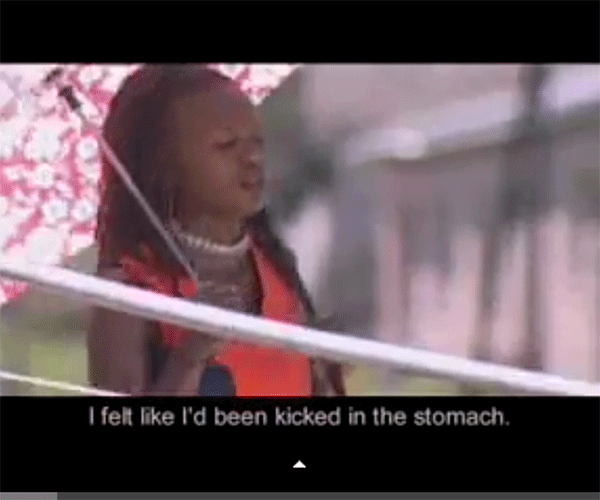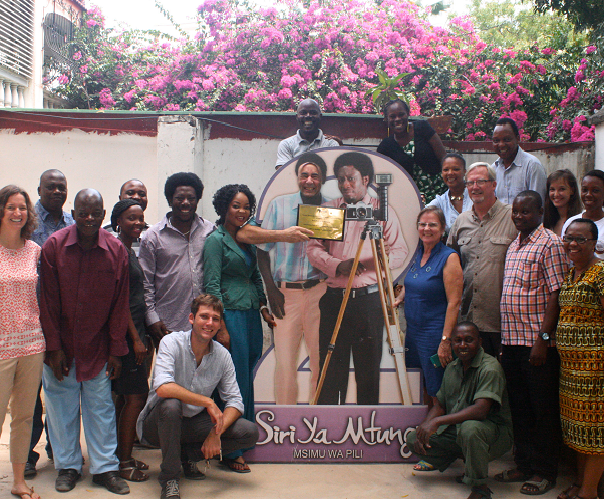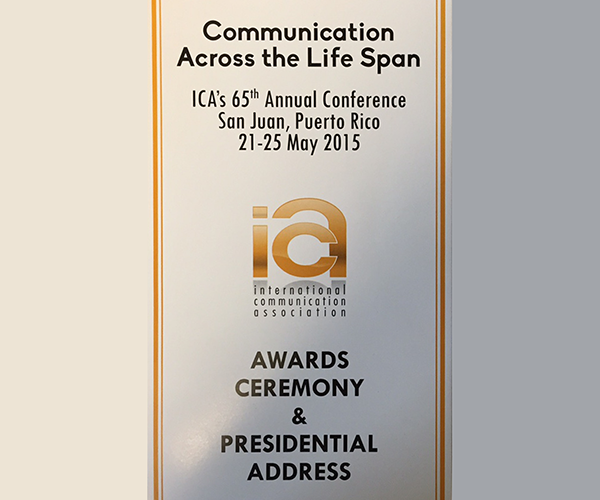Programs created under the Health Communication Partnership umbrella led by Johns Hopkins University Bloomberg School of Public Health Center for Communication Programs (CCP) swept the Awards for Excellence in HIV and AIDS Communication in Africa at a ceremony held on May 28, 2007, at the Hilton Hotel in Sandton, South Africa.
The awards, presented by AfriComNet, recognized work in six categories: best mass media campaign, intervention or production; best folk media initiative; best multi-channel communication; best interpersonal/community-based communication; best HIV- or AIDS-related article, series or column; and the Chairman’s Award.
Winning in the category of best mass media campaign was the television serial drama, Tsha Tsha, an entertainment-education initiative at the center of a collaborative effort between South African Broadcasting Corporation Limited (SABC), the Centre for AIDS Development Research and Evaluation (CADRE), and the Health Communication Partnership (HCP). Premiered in April 2003, the drama depicts the challenges facing young South Africans, and aims to enhance its young adult viewers’ capacity to reflect on their own problems, engage in developing solutions, and become active agents in shaping their future.
What makes Tsha Tsha effective is its compelling and contemporary story lines. The drama focuses on the lives of several young people who are exploring love, sex and relationships in a world affected by the realities of the AIDS pandemic. Set in a fictional rural town, the drama explores young peoples’ lives as they make the transition into adulthood.
The U.S. President’s Emergency Plan for AIDS Relief (PEPFAR) supports the research, development, and production of Tsha Tsha through the U.S. Agency for International Development (USAID), which supports HCP. HCP provides technical assistance in all aspects of the show’s design, scripts, production, research and evaluation, and funds all elements of production. HCP—which is based at Johns Hopkins Bloomberg School of Public Health’s Center for Communication Programs (CCP)—also works with SABC-Education, CADRE, and other South African partner organizations to set up community viewing clubs for the series.
HCP worked on the research and development of the initial 26 episodes of the series providing input into the development of the characters, the unique message style of the series, and the design of the impact evaluation. Results from the evaluation after the first 13 episodes show a significant impact in relation to improved attitudes to HIV/AIDS, stigma, condom use, living openly and positively with HIV, VCT, and faithfulness.
Winning in the category of Best Folk Media Initiative was Uganda’s “Rock Point 256” radio serial drama and comic book series.
Produced by HCP with technical assistance from Media for Development Trust and launched in August 2005, this radio serial drama is the centerpiece of the YEAH (Young Empowered and Healthy) campaign. Rock Point 256 tells the story of people living in a fishing and farming community called Rock Point. Characters in the drama model positive behavior change over time.
In year one, the series concentrated on transactional sex, defined as the exchange of sex for gifts, favors, or money. Young people aged 15-24 were given three clear messages: abstain from sex until you are ready to settle down for a long-term relationship; set long-term goals that you do not compromise for material gain; and do not give or receive gifts or favors in exchange for sex. Adults were also given a message: examine your personal role in protecting young people.
As of August 2006, the first 52 episodes aired in five languages on 10 radio stations across Uganda. Rock Point 256 is produced in English, Luganda, Runyankole/Rukiga/Runyoro/Rutooro, Lwo and Ateso.
In the category of Best Multi-channel Communication is the HCP partner, Straight Talk Foundation (STF) for their radio, newsletters, and outreach for young people in Uganda . The broad objective of STF is to contribute to the improved mental, social and physical development of Ugandan adolescents (10-19) and young adults (20-24). The program also aims to keep its audience safe from HIV/STD infection and early pregnancy and to manage challenging circumstances such as conflict and deprivation. STF produces 53 radio shows a week in 11 languages and about a dozen publications. Furthermore, the program conducts interactive face-to-face activities in schools and communities. STF is a poverty-focused civil society organization.
The Award for Excellence in Interpersonal/Community Based Communication went to The Zambia Creative Heart Contest. Designed by youth for youth, the Helping Each other Act Responsibly Together (HEART) program provides young adults with information about HIV/AIDS, discusses ways to prevent HIV/AIDS, and promotes abstinence and condom use. With support from the U.S. Agency for International Development, Johns Hopkins Bloomberg School of Public Health’s Center for Communication Programs (CCP) and Population Services International help implement HEART.
The Zambia Creative HEART Contest encouraged youth in nine districts to incorporate HIV/AIDS prevention messages into songs, dances, dramas, artwork, poems and debates. Youth competed at the school, zonal, and district levels. The program provided a unique opportunity for young people to explore their own thoughts and ideas related to HIV/AIDS, to develop their opinions based on information they received from adults in the community, and to expose the wider community to important HIV/AIDS and life skills messages. By the close of the contest, 479 teachers received training in nine districts, and 7,643 pupils entered the contest.
The Health Communication Partnership (HCP) is a global communication initiative based at the Center for Communication Programs in the Johns Hopkins Bloomberg School of Public Health. HCP partners include the Academy for Educational Development, Save the Children, the International HIV/AIDS Alliance, and Tulane University’s School of Public Health and Tropical Medicine.
The Center for Communication Programs (CCP) is a leader in the field of strategic, evidence-based, communication programs for behavior change to save lives, improve health, and enhance well-being in communities around the world. The Center is a part of the Johns Hopkins Bloomberg School of Public Health, the oldest and best-ranked institution of its kind in the world. CCP’s approach is to work with local and international partners to address the causes, preventions, treatments, and management of health risks by influencing the public’s knowledge of and response to personal health. CCP works responsively and proactively on the world’s most pressing health concerns such as HIV/AIDS, reproductive health, malaria, Avian and Pandemic Influenza, safe water, nutrition, and infectious and chronic diseases.
The African Network for Strategic Communication in Health and Development (AfriComNet) is an association of HIV and AIDS, health and development communication practitioners who reside, work, or have a primary interest in Africa. Formerly known as the Regional HIV and AIDS Behavior Change Communication Network (BCC Network), AfriComNet was established in October 2001 in recognition of the severity of the continent’s HIV and AIDS pandemic and the need for high-quality strategic communication to respond to the crisis.





